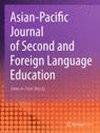高、低水平英语学习者计划使用母语汉语或二语英语对口语表现的影响
IF 2.2
Q2 EDUCATION & EDUCATIONAL RESEARCH
Asian-Pacific Journal of Second and Foreign Language Education
Pub Date : 2023-11-15
DOI:10.1186/s40862-023-00210-8
引用次数: 0
摘要
口语是学习第二语言的主要目标之一。尽管计划和语言迁移在二语学习中的作用越来越受到关注,但使用不同语言和任务前计划对语言产生的综合影响尚不清楚。本研究探讨不同语言的规划是否会影响言语表现,以及这种影响是否因语言能力的不同而不同。共有84名在中国大学学习英语作为外语的学生在计划使用他们的第一语言(L1)汉语或L2英语后参加了几个口语任务。研究结果表明,使用第一语言进行计划时,口语表达的句法复杂性、准确性和流畅性显著高于使用第二语言进行计划时,而词汇多样性差异无统计学意义。进一步分析表明,对于言语准确性,低水平学习者的母语促进作用强于高水平学习者。本研究的发现支持了二语学习者在口语活动中使用整个语言库,并对言语产生理论和译语教学法提供了启示。本文章由计算机程序翻译,如有差异,请以英文原文为准。
The effects of using L1 Chinese or L2 English in planning on speaking performance among high- and low-proficient EFL learners
Abstract Speaking constitutes one of the main goals of learning a second language (L2). Despite the increasing attention on the role of planning and language transfer in L2 learning, the combined effect of using different languages and pre-task planning on language production remains unclear. This study investigated whether the use of different languages in planning affects speaking performance and whether the effect differs by language proficiency. A total of 84 students in Chinese universities learning English as a foreign language participated in several speaking tasks after planning using their first language (L1) Chinese or L2 English. Findings showed that using L1 in planning results in significantly higher syntactic complexity, accuracy, and fluency in speaking performance than using L2 in planning, while the difference in lexical diversity were not statistically significant. Further analysis shows that for speech accuracy, the facilitative effect of L1 was stronger among low-proficient than high-proficient learners. Findings from this study support the use of L2 learners’ entire linguistic repertoire in speaking activities and provides implications on speech production theories as well as translanguaging pedagogies.
求助全文
通过发布文献求助,成功后即可免费获取论文全文。
去求助
来源期刊

Asian-Pacific Journal of Second and Foreign Language Education
Arts and Humanities-Language and Linguistics
CiteScore
2.90
自引率
5.60%
发文量
40
审稿时长
5 weeks
 求助内容:
求助内容: 应助结果提醒方式:
应助结果提醒方式:


